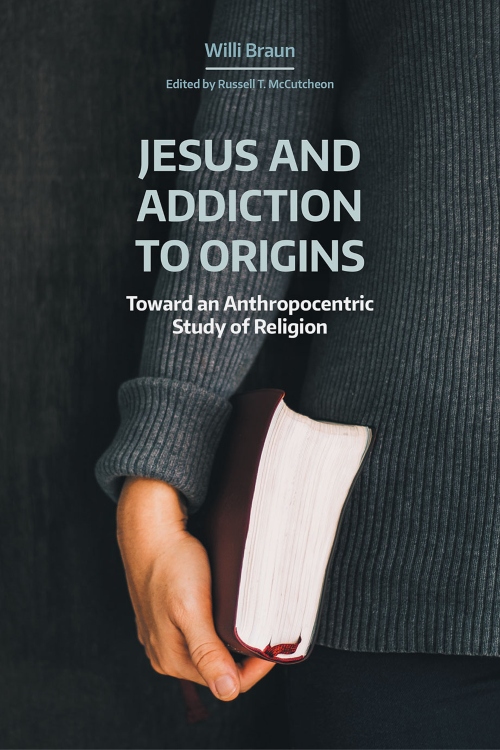Jesus and Addiction to Origins by Willi Braun
This collection of essays constitutes an extended argument for an anthropocentric, human-focused study of religious practices
 Jesus and Addiction to Origins - Toward an Anthropocentric Study of Religion
Jesus and Addiction to Origins - Toward an Anthropocentric Study of Religion
By Willi Braun
Equinox
ISBN 978 1 78179 942 0 (hardback), 943 7 (paperback), 944 4 (PDF)
Reviewed by Alec Gilmore
If the juxtaposition of ‘Jesus’ and ‘Origins’ suggests a re-run of New Testament biblical studies, think again. Braun is different, starting in a different place, with a different agenda, and offering fresh insight rather than traditional info, highlighting hazards and warnings rather than contentedly re-affirming the familiar. His laudable objective is to explore Religion as a normal human and universal experience in a purely secular, humanistic, scientific way, independent of specific religions (faiths, beliefs, or creeds), to take it off its pedestal and nurture its roots.
After three chapters of Generalities, a further seven address Particularities, beginning with a Case Study of how Christians view their Origins.
‘Addiction’ suggests drugs which crop up in a chapter entitled, ‘In the Beginning Was Not the Word’. ‘Drugs’ and ‘Words’ have much in common. Both, for example, have a superhuman effect on body, mind and spirit, with power to ease pain or inflict it, to hurt or to please, to stimulate courage or fear, to heal or to kill, but never without consequences for the psyche. Hence his harsh criticism of scholars who ‘begin and end their studies with an envelope that is stuffed with words, word-oriented methods of explanation (and) logographic theories‘. For example, the Greek logos (tr. ‘word’), has a power to convey a force of feeling way beyond the more neutral English ‘word’ (pp 98ff), with a capacity to initiate and achieve what it defines. Likewise the Hebrew dabhar in the Old Testament. God’s ‘word’ is indistinguishable and inseparable from his action.
An Afterword contains a salutary reminder that the biblical texts which we regard as ‘sacred’ started life not as religious documents set apart from everyday concerns but in the world and language of sociology and politics, and to see them otherwise is to separate them from the cultures in which they originated. (pp 184ff). Words, overall, are a limited and inadequate means of communication when separated from their social and cultural contexts, and even more so when translated and embedded in written form.
Two essays cover addiction to ‘an excess of historical ‘Jesuses’ and the hazards of creative and imaginative presentations, such as the American Jesus, while throwing fresh light on the Christian Origins of Mark’s Gospel and Q. Two others cover celibacy, sex, gender and Empire in the Greco-Roman World, alongside ‘Physiotherapy of Femininity’ in early Christianity.
Familiar expressions of religion associated with 'another world' (gods, creeds, spirits and demons), wielding supernatural powers and well entrenched in ancient religious texts and set apart from everyday concerns, are not denied but regarded as varied responses to religion per se, which in Braun’s view is ‘the first form of self-consciousness’ (p182), beginning in our world, addressing highly important and relevant matters concerned with power and social relations, (p 184) made intelligible in the language of sociology and politics.
An alternative and more accessible approach might be to think of ways of being human, making sense of Values in ways that accord with our understanding of human behaviour, especially in situations where they run counter to common culture. Maybe it is time to take religion off its pedestal, to see it not as something to believe, obey, follow or hand down but something ‘to own’.(p 186). To leave it where it is as ‘something apart‘ is to misconstrue the ordinary and everyday.
Not exactly ‘readable’. Metonymically (p 121) had me reaching for the dictionary and one sentence of twelve lines with 3 commas, 2 dashes and three sets of parenthesis (which might profitably have gone under Notes) is more soporific than stimulating.
Alec Gilmore is a Baptist minister
Baptist Times, 06/05/2021